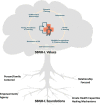Creating Empowering Conditions for Nurses with Workplace Autonomy and Agency: How Healthcare Leaders Could Be Guided by Strengths-Based Nursing and Healthcare Leadership (SBNH-L)
- PMID: 34349581
- PMCID: PMC8326221
- DOI: 10.2147/JHL.S221141
Creating Empowering Conditions for Nurses with Workplace Autonomy and Agency: How Healthcare Leaders Could Be Guided by Strengths-Based Nursing and Healthcare Leadership (SBNH-L)
Abstract
The COVID-19 pandemic had the unintended consequence of placing nurses in the spotlight because their knowledge and skills were in desperate need. While it will be years until we fully understand the impact that this pandemic has exacted on the nursing workforce, early studies have found that nurses have been traumatized by this event and many intend to leave the profession This seismic event only further exacerbated an already vulnerable and strained nursing workforce that pre-existed worldwide prior to COVID-19. The pandemic also highlighted the many challenges facing nursing leadership, in particular, how to create conditions to maintain and sustain a healthy nursing workforce. Nurses' job satisfaction has emerged as an important predictor of whether nurses remain in an organization and stay in the profession. When examined more closely, job satisfaction has been related to nurses feeling empowered to exercise autonomy over their own practice and having agency. Autonomy and agency, in turn, are affected by their managers' leadership styles. Leaders are instrumental in setting the tone and creating the climate and culture that either values or devalues autonomy and agency. To help leaders create empowering conditions, we have developed a guide for leaders. This guide, based on the value-driven philosophy of leadership called Strengths-Based Nursing and Healthcare Leadership (SBNH-L), is founded on principles of person-centered, empowerment, relationship-focused, and innate capacities (ie, strengths) that are operationalized in eight core values. This guide can be used by leaders as their roadmap to create empowering workplace conditions that value and facilitate nurses' autonomy and agency.
Keywords: agency; empowerment; job satisfaction; leadership; nursing; professional autonomy.
© 2021 Gottlieb et al.
Conflict of interest statement
The authors have declared that no competing interests exist.
Figures
Similar articles
-
Disentangling the relationships between staff nurses' workplace empowerment and job satisfaction.J Nurs Manag. 2016 Nov;24(8):1060-1070. doi: 10.1111/jonm.12407. Epub 2016 Jun 28. J Nurs Manag. 2016. PMID: 27353065
-
Health-promoting leadership: A qualitative study from experienced nurses' perspective.J Clin Nurs. 2018 Dec;27(23-24):4290-4301. doi: 10.1111/jocn.14621. Epub 2018 Jul 27. J Clin Nurs. 2018. PMID: 29987859
-
Cultivating Strengths-Based Leadership Capabilities: The Strengths-Based Nursing and Healthcare Leadership Capabilities Framework.Nurs Leadersh (Tor Ont). 2024 Apr;36(4):9-16. doi: 10.12927/cjnl.2024.27312. Nurs Leadersh (Tor Ont). 2024. PMID: 38779831
-
Professional autonomy in nursing: An integrative review.J Nurs Manag. 2021 Sep;29(6):1565-1577. doi: 10.1111/jonm.13282. Epub 2021 Feb 26. J Nurs Manag. 2021. PMID: 33548098 Review.
-
Authentic leaders creating healthy work environments for nursing practice.Am J Crit Care. 2006 May;15(3):256-67. Am J Crit Care. 2006. PMID: 16632768 Review.
Cited by
-
Hospital personnel perspectives on factors influencing acute care patient outcomes: a qualitative approach to model refinement.BMC Health Serv Res. 2024 Jul 12;24(1):805. doi: 10.1186/s12913-024-11271-x. BMC Health Serv Res. 2024. PMID: 38992658 Free PMC article.
-
Factors determining safety culture in hospitals: a scoping review.BMJ Open Qual. 2023 Oct;12(4):e002310. doi: 10.1136/bmjoq-2023-002310. BMJ Open Qual. 2023. PMID: 37816540 Free PMC article.
-
Does Organizational Commitment to Mental Health Affect Team Processes? A Longitudinal Study.J Healthc Leadersh. 2023 Nov 23;15:339-353. doi: 10.2147/JHL.S429232. eCollection 2023. J Healthc Leadersh. 2023. PMID: 38020722 Free PMC article.
-
Evaluation of the effectiveness of a Strengths-Based Nursing and Healthcare Leadership program aimed at building leadership capacity: A concurrent mixed-methods study.Int J Nurs Stud Adv. 2024 Feb 6;6:100184. doi: 10.1016/j.ijnsa.2024.100184. eCollection 2024 Jun. Int J Nurs Stud Adv. 2024. PMID: 38746801 Free PMC article.
-
Exploring the connections between destructive leadership styles, occupational pressures, support systems, and professional burnout in nursing: a cross-sectional survey.BMC Nurs. 2025 Jul 1;24(1):681. doi: 10.1186/s12912-025-03421-1. BMC Nurs. 2025. PMID: 40598258 Free PMC article.
References
-
- International Council of Nurses. Nurses: A Voice to Lead Nursing the World to Health. Geneva, Switzerland: ICN; 2020.
-
- Nursing now global campaign. Available from: www.nursingnow.com. Accessed June26, 2021.
Publication types
LinkOut - more resources
Full Text Sources


